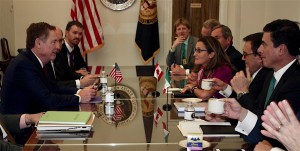
U.S. Trade Representative Robert Lighthizer, left, talks with Canada's Chrystia Freelander and Mexico's Ildefonso Guajardo, both right.
The already tense negotiations among the U.S., Canada and Mexico to revise NAFTA may need to be extended past the March deadline because of the slow pace due to the depth of disagreements between the U.S. and its pact partners.
According to Reuters, a senior Mexican official said talks could be extended and that an extra round of talks between the sixth round, which is ongoing in Montreal, and the seventh round in Washington D.C. in March, could take place.
The talks were supposed to end in March to avoid any conflicts with Mexico’s presidential election, but that doesn’t occur until July. Economy Minister Ildefonso Guajardo said the deadline could be extended.
“This negotiation has a window of opportunity to reach a deal between February and the end of July,” he told Reuters.
(Business groups plead to keep NAFTA. Click Herefor the story.)

Flavio Volpe, the president of the Automotive Parts Manufacturers Association of Canada, said keeping the talks moving is imperative.
Canada presented several suggestions on how to unfreeze the talks, welcomed the idea.
“Canada does not believe that we need put an arbitrary deadline on these negotiations at the cost of a good deal for all three countries. We are happy to continue negotiating,” a government source told Reuters.
The American contingent didn’t seem as keen on the idea of an “overtime” period. U.S. chief negotiator John Melle told Reuters, “I have nothing to say on that. We are pushing ahead.” The potential roadblock comes as more than two dozen chambers of commerce from all three countries appealed to negotiators to keep the trade deal largely unchanged this week.
(Click Here for more about the rise in Mexican imports in 2017, despite Trump pushback.)
In addition to adding more talks after the March deadline, the side are considering squeezing another round before then as well. The three nations are a looking at a week of talks in Mexico, possibly starting Feb. 26, said the sources.
The speed of the talks is being hampered by U.S. demands to make a new deal more U.S. friendly. Unsurprisingly, this has created a bit of a chasm the United States and its two partners. For example, the Trump Administration is demanding North American content on vehicles to be higher than in the past.
Canada responded by suggesting that content would be higher if the value of software and other high-tech materials made by the three nations were taken into account. Reuters reported U.S. and Mexican negotiators found the idea interesting but gave no details.
(To see why ending NAFTA cripples U.S. trade, according to a Clinton aide, Click Here.)
Additionally, Mexico and Canada dismissed a separate U.S. demand that 50% of all autos produced in NAFTA nations must have American-made content, Reuters reported. They also object to the idea of a subset case that would allow one party to pull out of the treaty after five years.
